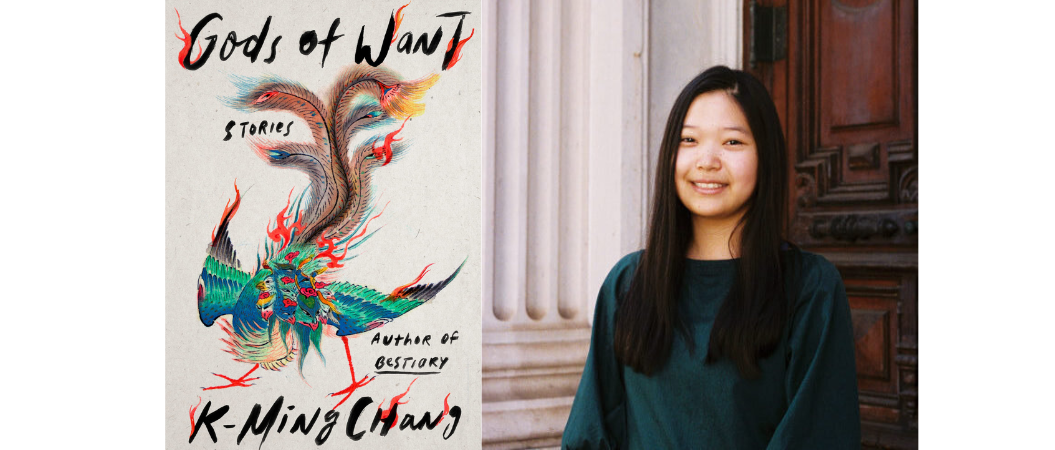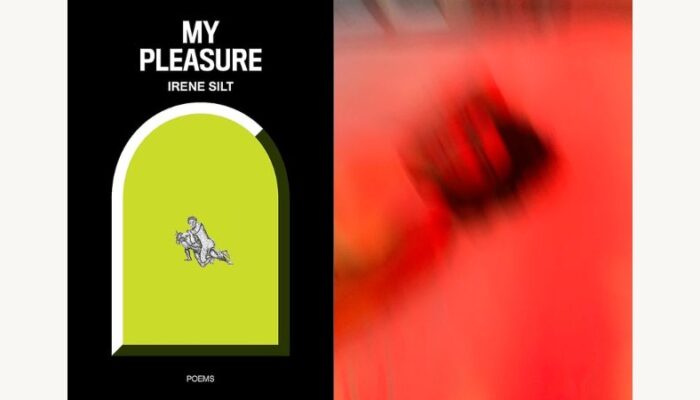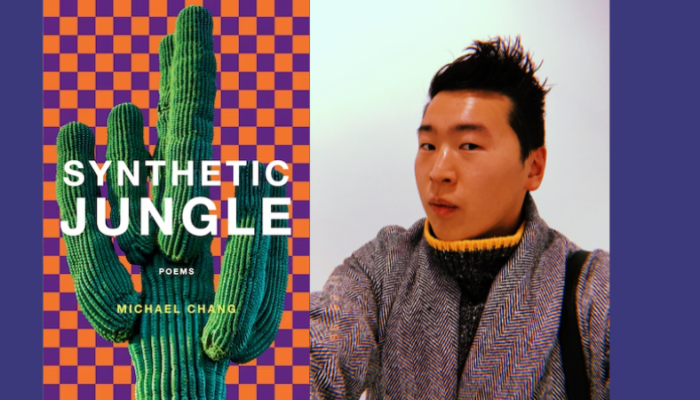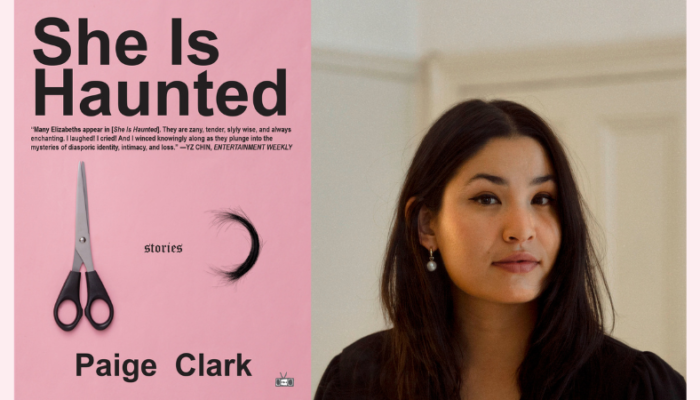Released last month, K-Ming Chang’s Gods of Want is more than the sum of its parts–in a collection of short stories narrated by what Chang calls the pluralistic “I”, a host of women from various walks of life seek answers from their environments. They fend off the mischievous ghosts of cousins, recount memories of classmates, grapple with impulses of desire or disgust. All are bound by a collective hunger, a want that drives these stories to fantastically wild heights. In each one, Chang seamlessly weaves prose and poetry, combining the expository potential of the former with the haunting abstraction of the latter. Every story reels with liveliness, contradiction, and desire, as howled from the mouth of a ghost or found in the arms of a lover, all humming with surreptitious and irreconcilable wants. A few weeks after the collection’s release, K-Ming Chang spoke with me on her writing process, the storytelling modes she emulates, and the elusive transcendence of language.
—Isabella Pechaty, Communications Assistant, Apogee Journal
This interview was edited for clarity and concision.
Isabella Pechaty: Your novel Bestiary came out in 2020, which is two years ago now already, and then Gods of Want is a collection of short stories. Could you describe the process going from the form of a novel to short stories? Did you find there was a natural continuation of themes? And what led to the change in format?
K-Ming Chang: I was actually writing these short stories while I was revising Bestiary for publication, so there was a lot of overlap between the two thematically and in terms of my interest in language, and what’s possible in form and structure. There’s a story in the collection called “Episodes of Hoarders,” and in my novel Bestiary, that same form is used. I think there are interesting resonances, and I think a certain kind of playfulness that I was interested in exploring for both.
But I think short stories, as a poet, felt like more of a homecoming for me, because the idea of a book being a collection, a collective of voices, a grouping, was something that felt very familiar to me. So even though short stories were a really new form for me, there was a sense of a return about it, because of its similarity with poetry, and in the way that I was thinking about the short story form and the poetic form as being able to inform each other.
They did overlap in the writing process. How I approached writing sentences, at the micro level, was very similar, and allowing the language to unfurl on the page and guide me through the process were really similar. So it makes sense that both of them are interested in similar things.
IP: Bestiary and Gods of Want have so many similarities in terms of tone, stylistic conventions, and so on, one of which being the treatment of characters. I was really interested in the narrators of these stories and the characters they interact with–do you see these stories as being narrated by the same person? Or versions of the same person? And then, for the stories written from first person perspective, do you identify with these narrators at all?
KMC: I remember thinking that, when I first read the collection, that almost all the stories were in first person. And I actually had to deliberately challenge myself to write two of them in third person. Because I think very naturally, I gravitate towards the first person. I think part of it comes from the poetry world, and the poetic “I,” which is something that really carried with me into prose. And so writing in third person, even though to me that is the symbol of a true prose writer, I am interested in the poetic “I.”
But I think that I’m less interested in the “I” as an individual than as a collective, part of a community, a family. So I think these first-person narrators in some ways effaced narrators, like in The Great Gatsby. Like how Nick is looking at Gatsby and observing, but is not really the protagonist. I’m interested in first-person narrators who aren’t really the main character, and who are constantly observing and constantly witnessing, and always projecting onto other characters. I’m interested in a pluralistic “I” when writing in first person.
IP: That’s really interesting, and definitely complicates my line of questioning, since I took many of these stories to be free-thought associating, or the recollection of memories from one person, or one source. Because these narrators interact with many others, like family, wives, and ghosts, but these interactions are written with such interiority.
KMC: There are a few stories, like “Xífù,” about a mother-in-law, that are almost entirely in monologue. I’m just really interested in exposition, and am also really influenced by flash-fiction, and what’s possible in that space. I’m more interested in telling than showing, which is really funny because the typical advice for writing is to show, and not tell. But I’m really interested in what a story can look like when it moves away from scene, or if it can mimic the form of oral storytelling. Because in oral storytelling, we typically talk in exposition, and in telling rather than formal scene or showing. So I think that’s where the impulse to write in monologue comes from.
Especially in that story about that mother-in-law, it’s like we’re being told a story by a narrator. I think it comes from being interested in oral forms, and the interior lives of a character. And especially because want and desire is oftentimes for these characters not able to be expressed in very literal ways. So, what does it mean forhunger and desire to be this place of the imaginary and the interior? I think that’s something that I’m really interested in with these characters.
IP: And does this desire relate to the title of the collection, Gods of Want, in any way?
KMC: I was thinking of each of the characters in this book as being a god of want, and how I think each narrator is interested in desire or want, but in slightly different ways. I was really interested in the plural of gods, rather than the god of want. In the book, I actually never use the phrase “gods of want,” I only use the phrase “god of want” to describe a raccoon. So it’s very singular in the book. But I thought about it, and thought how this is not really about a singular deity of desire. I started to realize it’s about these collective hungers, and these collectives of women and girls across generations, who embody their desires in different ways. So adding the plural to the title was like a deliberate revision of the way that I actually used the phrase in the book.
IP: This was a quality I found came up both in your novel Bestiary, but also in Gods of Want – the visceral, sensory language really stood out to me. I was curious if you used any visual or physical inspiration or stimuli, like pieces of art, that helped you write?
KMC: That’s funny because I don’t consider myself a visual person, and people tell me that my writing is very visual. I think I am more drawn to language than image. I don’t particularly look at a lot of visual references, but I find that if I follow the sonic qualities of the language and how it sounds, it usually reveals to me something really interesting or something visual. I tend to be a language first person. I tend to think about it in very abstract ways, so I think about how it feels to say a word, how it sounds, and it looks, before I think about the actual meaning of the word. Which can sometimes lead me really astray, and lead me down paths where I’m like, Okay, this makes absolutely no sense. And I have to rewrite all of this! But other times, it leads me to these very sensory and visceral and visual places. So for me, it tends to be rooted in language, and wanting to play with the language experimentally, rather than looking at something visual.
IP: And in your writing process is there ever a step where you read your work aloud to yourself or others?
KMC: It’s something that is huge in my process, but I find that when I read something out loud, usually after it’s published, I have a new understanding of it. It’s almost revealed to me what my intentions or motivations were. But I tend to be someone who reads things in my mind and I don’t always verbalize it. Coming from poetry, though, I think there is so much performance and reading and storytelling involved in the process. Poetry is meant to be read aloud. So I think I approach my prose thinking about how it will sound out loud, even if I don’t literally say it out loud. I think a lot about the texture and the layering of the language, and how it will exist off the page.
IP: Continuing on the thought of writing based off of what comes naturally rather than structuring it ahead of time–in terms of the tone of these stories, they are described as surreal, or using magical realism, and very unique. Is that a tone that you strive to create? Or is it something that comes naturally while writing?
KMC: I think the tone is not something that I deliberately try to do, but I try to write towards a sense of delight or surprise. If I follow what will make me feel joyful in the moment, it ends up creating a variation in tone. I’ll often start with an image or metaphor that I feel is very serious or weighted, but I want to delight or surprise myself, so it ends up going in a lighter direction than I intended just based on word choice. So I think because of that, I try to be as playful as possible with the tone, and not feel as though I’m locked into a certain mood or tone that I’m trying to create. I try to treat it flexibly, and allow for a sense of mystery, and allow for a sense of spontaneity. Which is very difficult, and in some ways unnatural for me, because in my life I’m definitely a planner. But in my writing, I try as much as possible to be open to possibilities, which for me can be a very challenging and scary state to be in.
IP: You mentioned the word delight, and earlier also mentioned the humorous and playful tone of these stories. I felt that there were many moments of mischievous or even crass humor, which not many people expect to resonate with the mythic structures, or the folk, oral storytelling you recreate. But I’ve found that, tonally, they often go hand in hand. Especially thinking about stories that I’ve heard from older relatives from their respective heritages.
KMC: Yeah, I think this tone comes from oral storytelling, but also a sense of always wanting to mix opposites. So, things that feel very contradictory, like beauty and disgust, the sacred and the profane, and the funny and the dark. I’m really interested in breaking down the boundaries between those things, and exploring how they’re actually very similar, or how they can exist altogether in one space or one body. It comes from wanting to break down the foundations of these emotions or dichotomies that we often keep really separate in our minds.
I think that’s where some of the crassness comes in too, because I’ve found that the crassness often comes out when I’m trying to describe something really beautiful. And vice versa – when I’m trying to describe something crass it ends up being beautiful. So it ends up that everything is always haunted by its opposite. I really love that feeling of attempting to do something and then going radically in a different direction. I find that sometimes the most dynamic parts of a story can emerge from that.
IP: So in general, it seems like Gods of Want is a piece that lends itself well to not being defined or structured in a super concrete way. But I was curious why the collection was divided into three sections of Mothers, Myths, and Moths?
KMC: I really love the triptych structure, and I’ve always wanted to use it. In some ways, it happened really subconsciously because I noticed there were a lot of M words that were occurring in the collection. I ended up pulling them out: it was mothers, myths, melons, mouths, moons, and a few others. And I realized that three of those M words were an organizing structure for all of the stories. In some way, every single section includes mothers, myths, and moths in their own ways. But there are certain sections that I think are totally and thematically united in certain ways. So I was really interested in the connections that could form if I began to let the language, wordplay, and sense of repetition guide how I structured the stories. Each section, I think, is the same story retold over and over again, but in slightly different angles or focused on slightly different things.
IP: Do you have a favorite, of all these stories included?
KMC: I have a few, but I think my favorite is “Mariela,” which is in the last section, Moths. To me, I think that story encompasses so many things from the other stories, like coming of age, violence and love, death, loss and grief, body humor and body horror. So that story feels really expansive, and threads of it run through all the stories. I feel a particular affection for those characters, because I feel like they’re so brutal but so playful at the same time. I think there’s something about them that feels really haunting and larger than life to me.
K-Ming Chang is a Kundiman fellow, a Lambda Literary Award finalist, and a National Book Foundation 5 Under 35 honoree. She is the author of the New York Times Book Review Editors’ Choice novel BESTIARY (One World/Random House, 2020), which was longlisted for the Center for Fiction First Novel Prize and the PEN/Faulkner Award. In 2021, her chapbook BONE HOUSE was published by Bull City Press. Her most recent book is GODS OF WANT (One World/Random House, 2022). Her next book is a novel titled ORGAN MEATS. She lives in California.
Isabella Pechaty is a Communications Assistant at Apogee journal, and a student at Barnard College, Columbia University pursuing a degree in Film Studies. She is a Staff Writer for the Arts & Entertainment section of the Columbia Daily Spectator.




